2023年12月4日至5日,由中國國家衛生健康委員會和世界衛生組織駐華代表處支持、意昂体育和全球衛生研究院舉辦的“構建新時代高質量的初級衛生保健,實現人人享有健康”國際研討會在北京召開。來自中國、西班牙🏜、新西蘭💔、韓國📽、蒙古、中國香港🧎♂️➡️、中國澳門等國家和地區的政府部門、學術機構,以及國際組織的領導和專家,200余人共同線下出席了本次國際研討會。

在開幕式上,中國人民政治協商會議全國委員會副主席蔣作君、國家衛生健康委員會副主任、黨組副書記雷海潮、世界衛生組織西太平洋地區辦公室代理區域主任蘇珊娜·雅克布博士、意昂体育平台常務副校長🤰🏼、醫學部主任喬傑院士分別致辭。論壇開幕式由意昂体育平台醫學部副主任王嘉東教授主持。
蔣作君指出👨👨👦,健康是經濟社會發展的天然動力🐂,也是人類文明進步的永恒追求,以人民為中心,完善健康治理🦹🏼♂️,反映了各國的共同願望,也是新時代的大勢所趨🐔🦹。聯合國可持續發展議程時間已經過半🪵。盡管全球人口的健康狀況有了顯著改善,但人人享有健康的目標任重道遠♓️🧑🏼💻,面對不安全和不公平的全球衛生挑戰,需要推動初級衛生保健的高質量發展。他強調,初級衛生保健在中國源遠流長🏄🏿♂️,中國的初級衛生保健事業在可及、公平、保障三個方面,走出了中國道路,凝練了中國經驗。他希望以本次研討會為契機,積極響應習近平主席在2021年全球健康峰會上提出共建人類衛生健康共同體的重要倡議,深入探討以人為本的健康發展理念和以健康為中心的治理思路和新舉措。對此他提出四點建議,一是要強化以人民為中心的發展理念👈🏼,促進服務的連續性,提升服務的便捷性🧑🏼⚖️🙍;二是要更好體現預防為主的工作方針,把以治病為中心轉變為以健康為中心,擴大衛生健康治理範疇♿;三是要加大對高質量初級衛生保健的宣傳倡導🍋。初級衛生保健不是低劣保健,而是最好最合適的保健,為推進健康中國建設和攜手推動構建人類衛生健康共同體做出貢獻。四是要加強國際交流與合作🐻。疾病無國界,尤其是傳染病防控,是人類面臨的全球性問題,必須加強國際交流與合作👨🏼🎤,開展全球行動與全球應對。
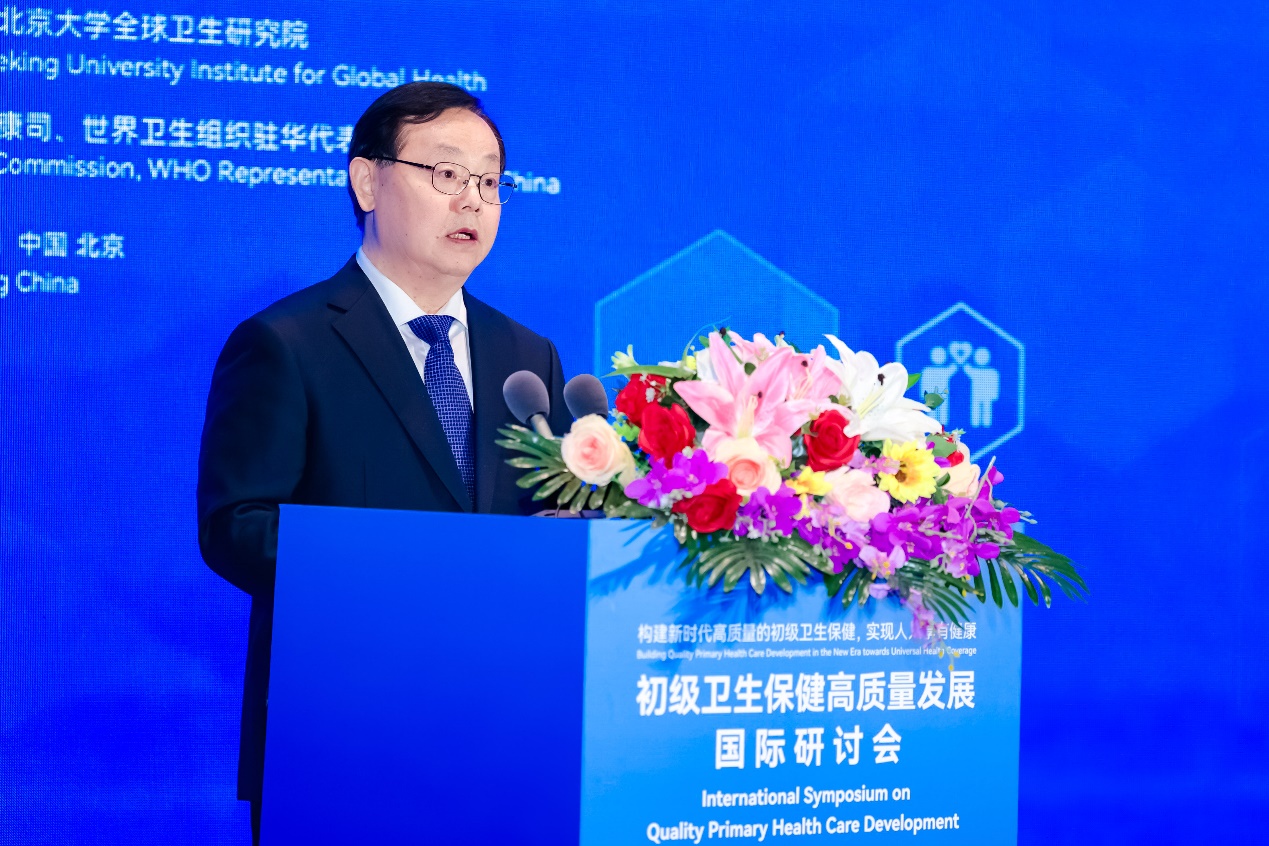
(中國人民政治協商會議全國委員會副主席蔣作君講話)
雷海潮指出,中國始終踐行以人民為中心的發展理念,高度重視促進初級衛生保健高質量發展💆🏻♂️,將加強基層醫療衛生服務體系建設、促進基本公共衛生服務均等化作為深化醫改和全面推進健康中國建設的重要內容予以推進。雷海潮強調,要貫徹落實“以基層為重點”的新時代黨的衛生健康工作方針👨🏿⚖️,落實政府責任,持續增強基層衛生健康服務能力,推動基層醫療衛生機構基礎設施建設和設備配備提檔升級,激發基層活力,提升基層醫療衛生服務質效👩🏻⚖️,深入推進家庭醫生簽約服務,發揮信息化技術優勢🪵,加強國際交流合作👋🤦🏽,為實現全民健康覆蓋👩🏻🌾、共建人類衛生健康共同體貢獻中國力量和中國方案🧑🏿🌾。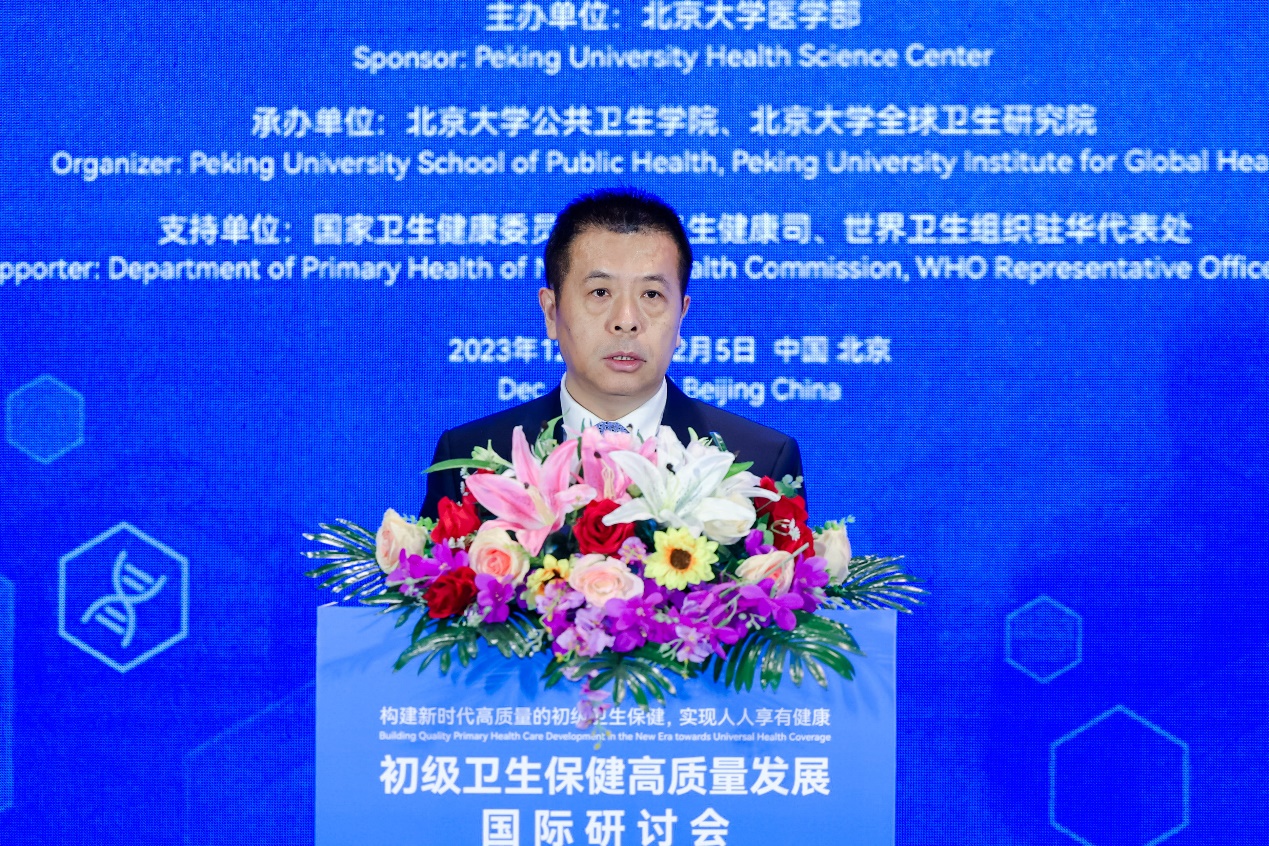
(國家衛生健康委員會副主任、黨組副書記雷海潮講話)
蘇珊娜·雅克布對研討會的召開表示祝賀,並表示🐜,健康對每個國家🏐、每個社區和每個人都至關重要🦥。自世界衛生組織成立75年來,在公共衛生領域取得了顯著進展🥷🏽。世界關註中國對全球初級衛生保健發展的貢獻以及通過改革取得的顯著進展。她指出🥀,我們今天面臨著前所未有的健康挑戰。應對挑戰🪨,我們需要強大的初級衛生保健,利用創新和技術進步,采取人人享有健康和健康融入所有政策的方針,並通過全生命周期方式實現最大水平的健康和福祉🎊。蘇珊娜說,這將是一個激動人心的新篇章的開始🫀,世界衛生組織很高興在這一旅程中與大家同行。蘇珊娜還強調🫠,我們必須更加努力地超越國家、爭取全球利益,這是共同繁榮和安全的最終保證🧏🏼♀️。
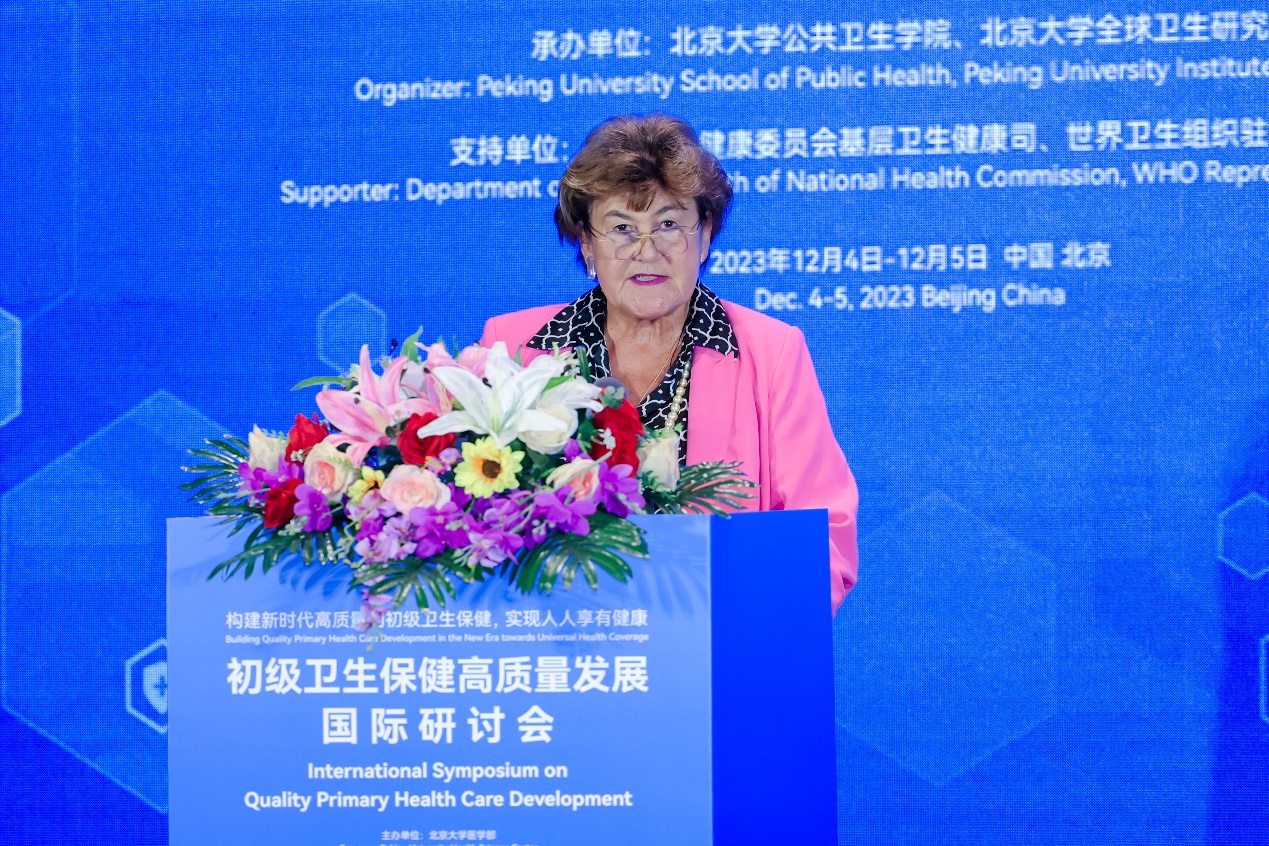
(世界衛生組織西太平洋地區辦公室代理區域主任蘇珊娜·雅克布博士講話)
喬傑指出👨🏿🍼,新冠全球大流行再次清晰地告訴我們👨🦼,面對全球公共衛生危機,沒有一個國家可以獨善其身🦶🏼👋🏻。加強全球衛生合作🪲,推動強化初級衛生保健體系建設,解決影響人類健康的重大公共衛生挑戰和健康不公平◻️,才是人間正道🫔。北大醫學將始終牢記“健康所系,性命相托”的誓言🦸♀️,在全科醫學人才培養體系、培養模式的建設上起到了示範引領作用🧕🏻,初步構成了輻射全國的政府-學校-社區三位一體的全科醫學人才培養體系🤰,有效推動了相關合作省市的全科醫學師資培訓工作進展。面對新時代衛生健康服務高質量的發展需求,北大醫學將堅持需求導向🌩,探索高質量基層醫療衛生服務人才培養創新模式;堅持系統觀念,持續完善大學醫防協同體系建設;堅持胸懷天下,積極推動國際交流合作👡。
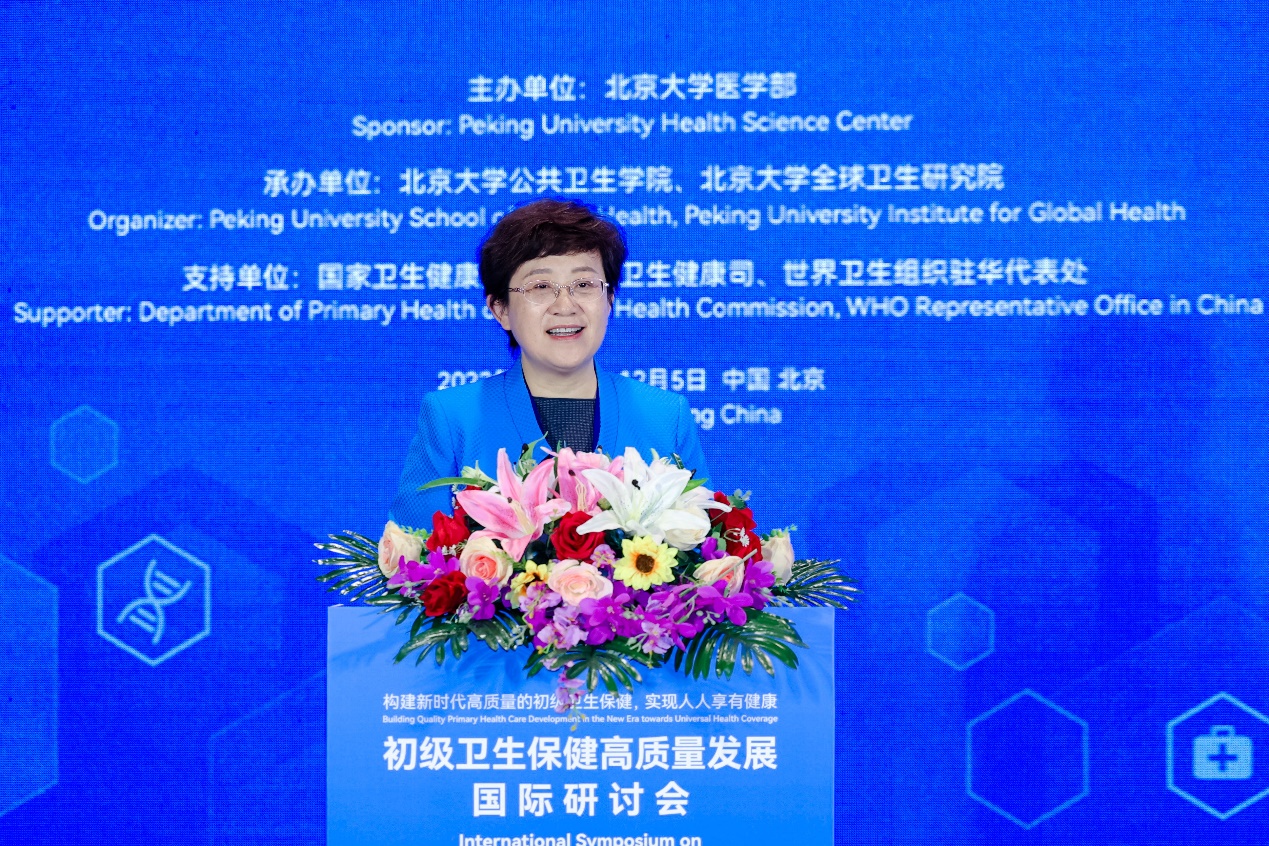
(意昂体育平台常務副校長、醫學部主任喬傑院士講話)

(會議由意昂体育平台醫學部副主任王嘉東教授主持)
意昂体育平台全球衛生研究院院長任明輝教授介紹了《初級衛生保健高質量發展北京倡議》的起草過程和主要內容。蔣作君副主席📵、雷海潮副主任、蘇珊娜·雅克布博士、世界衛生組織助理總幹事布魯斯·艾爾沃德博士、喬傑常務副校長、國家衛健委基層衛生司司長傅衛、世界衛生組織駐華代表馬丁·泰勒博士,以及意昂体育院長詹思延教授和任明輝共同啟動了《北京倡議》正式發布。(全文附後)
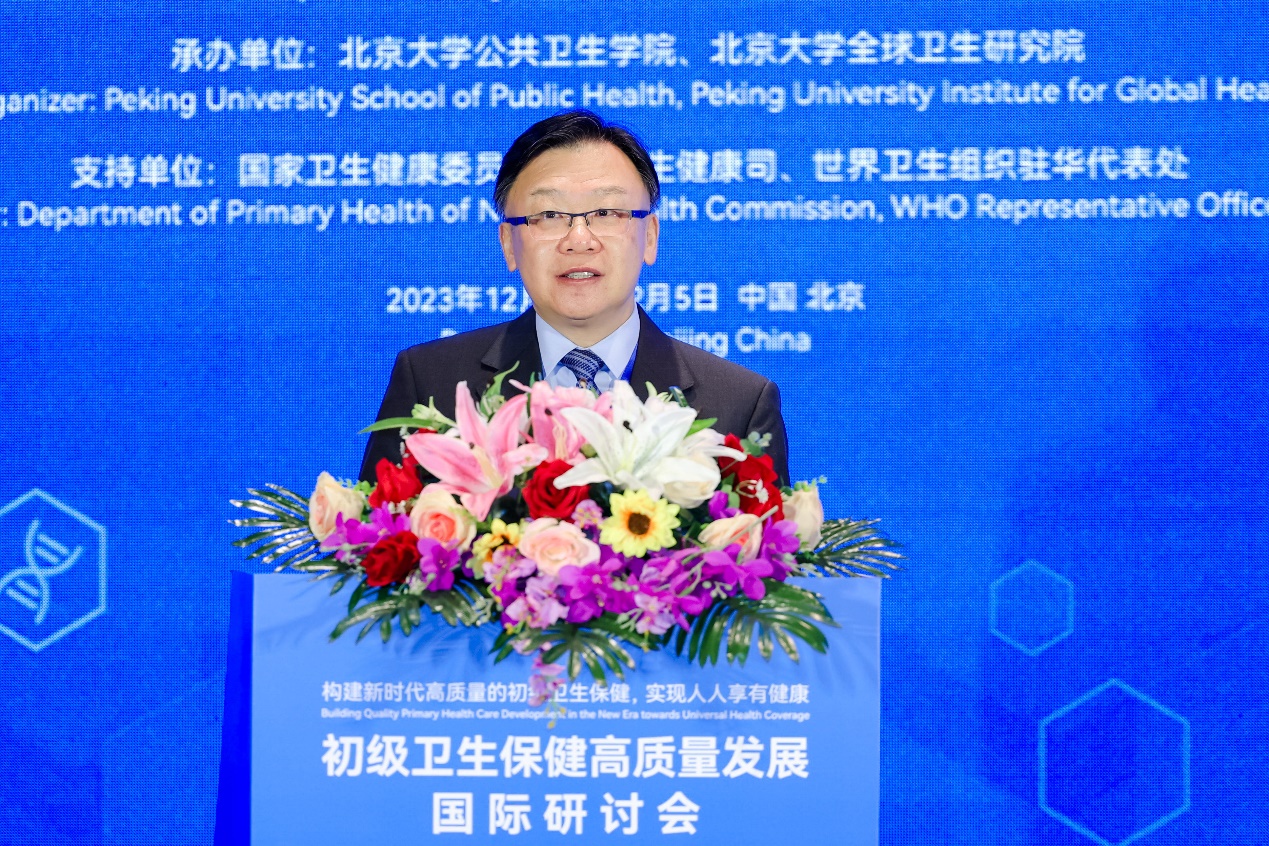
(意昂体育平台全球衛生研究院院長任明輝教授講話)
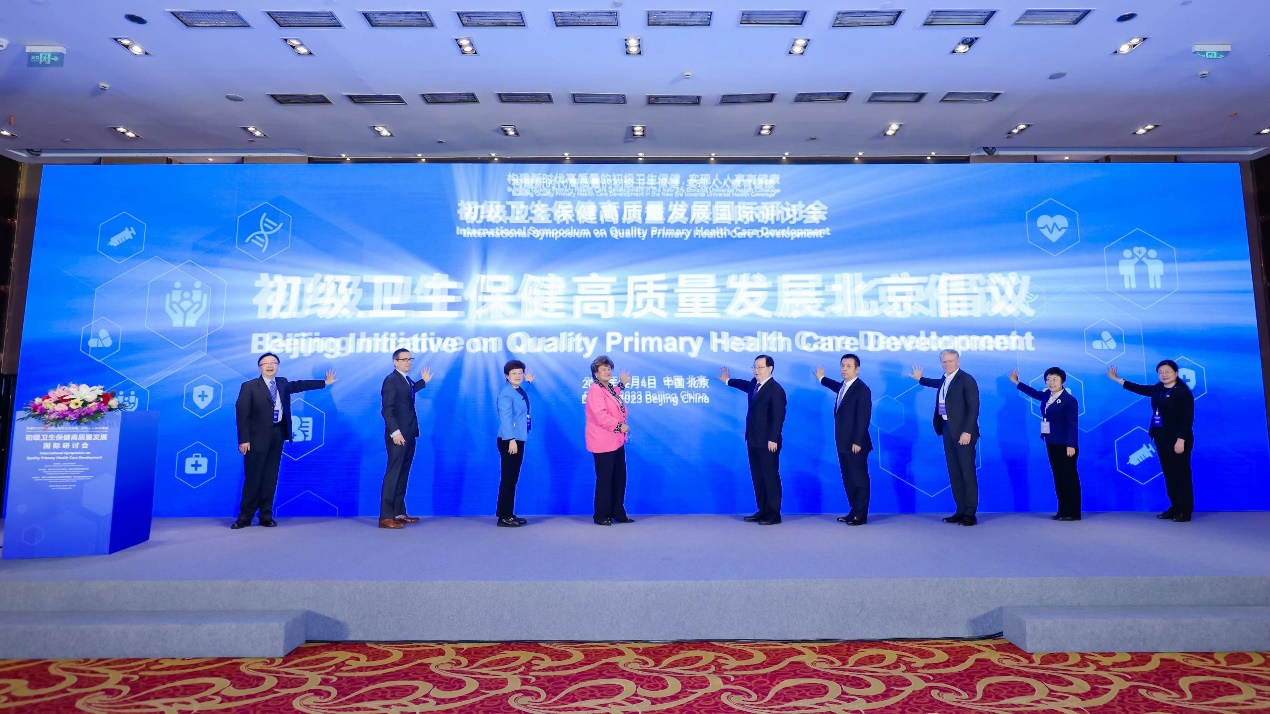
(《初級衛生保健高質量發展北京倡議》正式發布)
經過匯總初級衛生保健相關國際宣言和倡議主要核心思想,《北京倡議》的起草參考了最近健康中國戰略實施和深化醫療衛生體製改革的成功實踐,以及全球其它國家地區初級衛生保健創新行動☝🏿⏫,並廣泛爭詢參會代表、中國國家衛健委和中醫藥管理局、世界衛生組織等國際組織意見𓀛,初級衛生保健高質量發展《北京倡議》提出11條倡議行動👨🏻🚀,包括落實政府承諾和責任;通過多部門協同將健康融入所有政策;建立可持續的籌資💆🏻;賦能社區和個人𓀎;提供以社區為基礎的整合型服務👨🔬;以良好的治理促進健康服務和社會服務銜接融合;加強人力資源的培訓、配置和激勵及醫學教育;推廣傳統醫學和替代醫學在疾病預防和疾患療愈中的應用;數字賦能初級衛生保健👩🏼🎓;確保醫藥產品和適宜技術的可及;以及增進全球夥伴關系與國際衛生合作。
布魯斯·艾爾沃德博士和傅衛司長分別作了題為《推進面向未來的初級衛生保健🏃🏻🌋:全球議程》、《基層衛生健康中國實踐和發展》主旨發言,國家衛生健康委衛生發展研究中心副主任甘戈對他們精彩報告進行點評,並主持了討論。
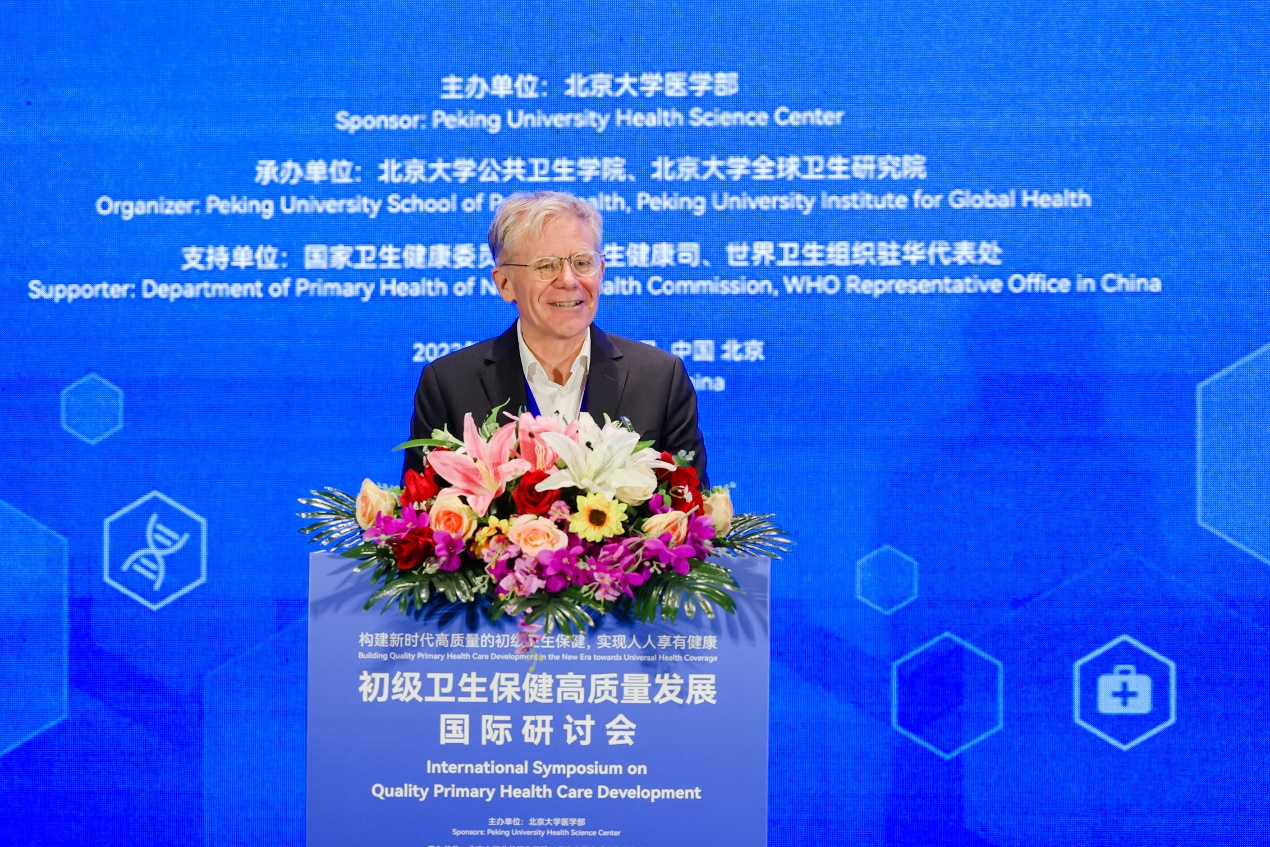
(世界衛生組織助理總幹事布魯斯·艾爾沃德博士發言)
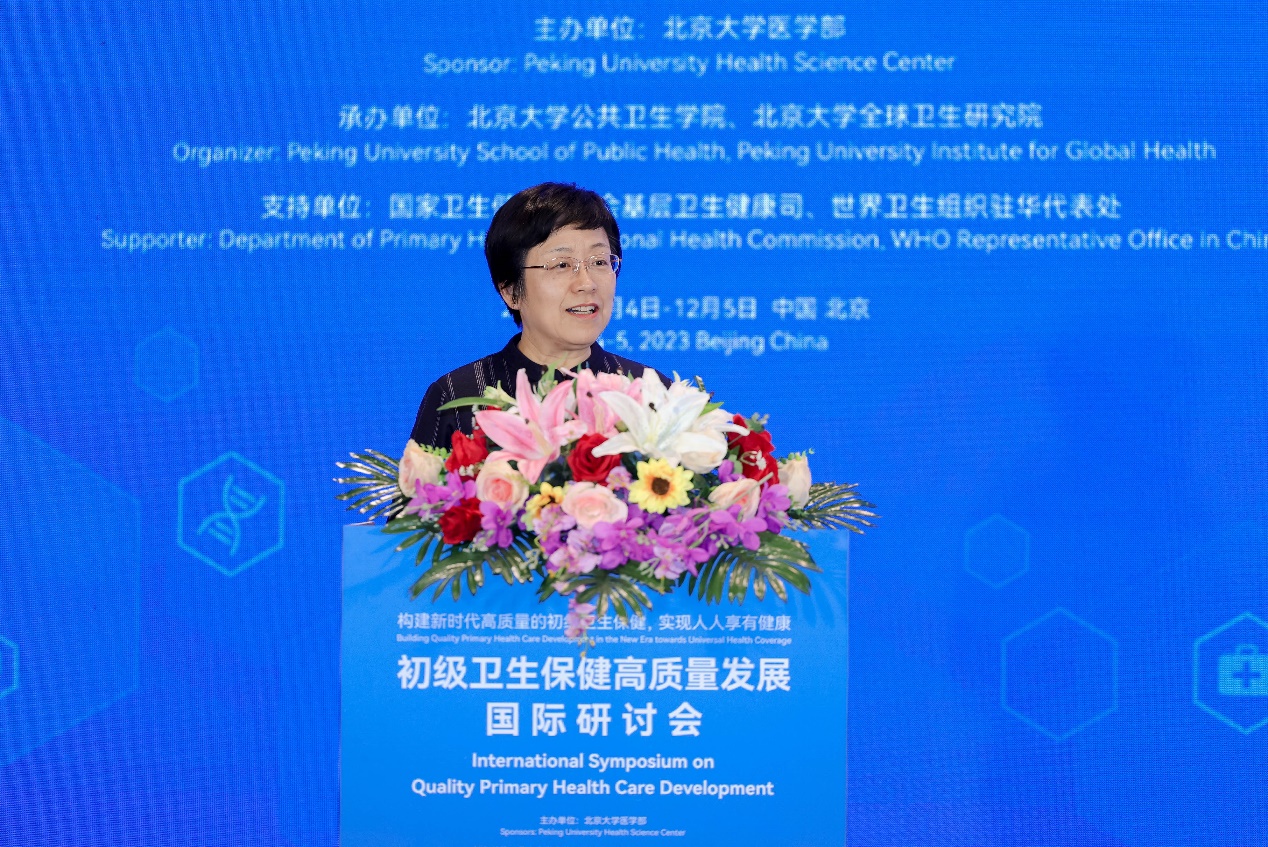
(國家衛健委基層衛生司司長傅衛發言)
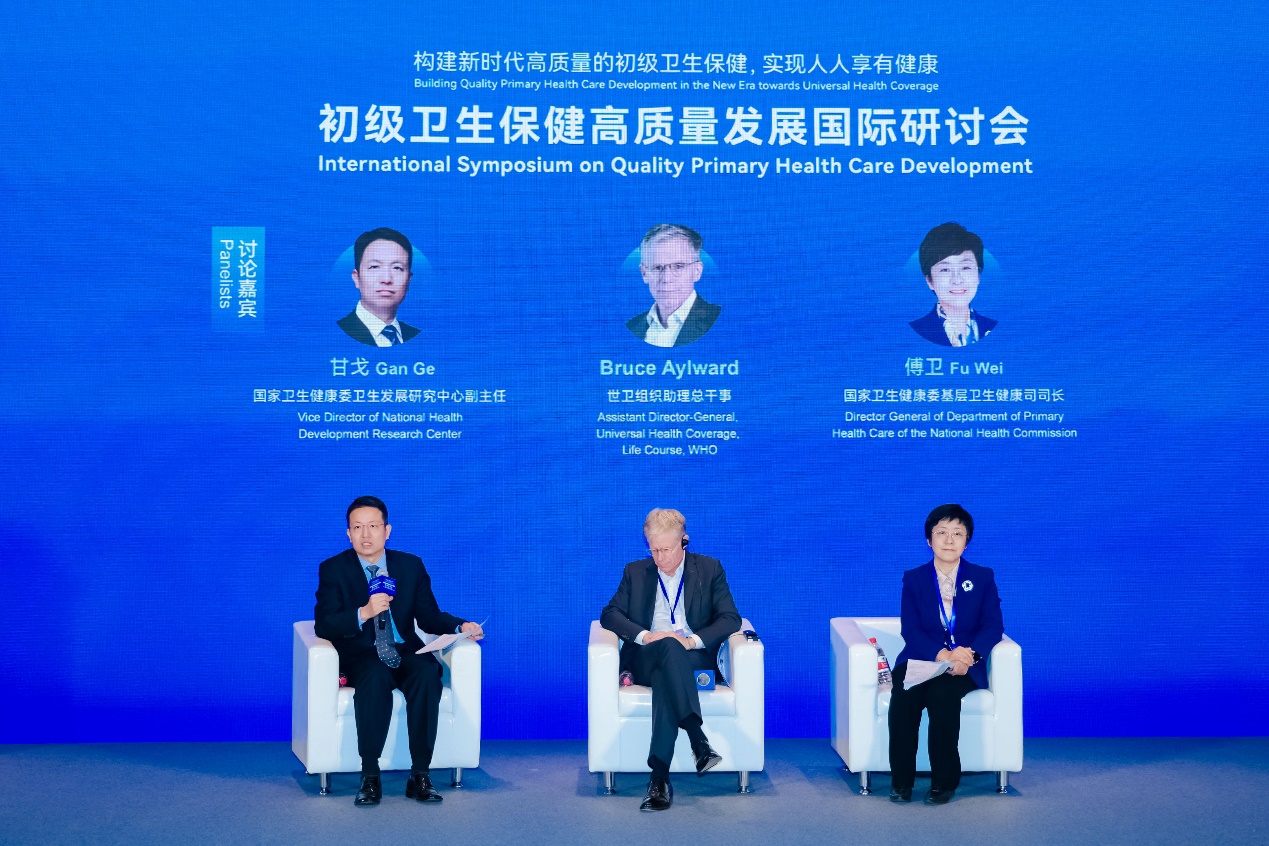
(國家衛生健康委衛生發展研究中心副主任甘戈點評並主持討論)
國家衛生健康委員會基層衛生健康司原司長聶春雷👨🏽🏭、世界衛生組織總部衛生體系韌性和基本公共衛生組負責人索赫爾·賽卡特👯♀️,世界衛生組織駐華代表馬丁·泰勒博士🏃🏻♀️、世界家庭醫學組織前主席李國棟🫗、北京市衛生健康委員會副主任王建輝、復旦大學意昂体育官网教授錢序⛄️,共同就初級衛生保健高質量發展在新時代的內涵🗾、中國經驗、如何動員高層政治承諾和可持續投入等展開圓桌討論,圓桌討論由世界衛生組織駐華代表處衛生體系和衛生安全協調員喬建榮主持。
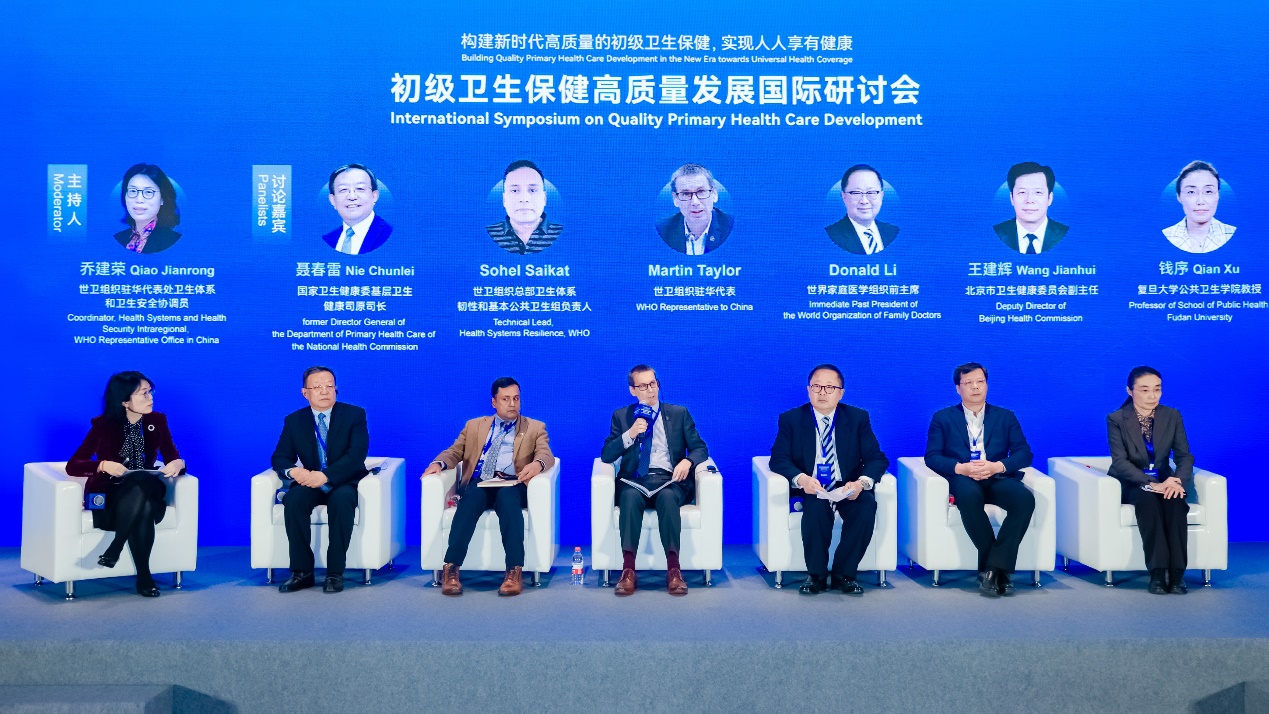
(圓桌討論)
本次研討會圍繞初級衛生保健的服務體系轉型、技術和治理創新、支持體系分別設置三個專題報告。
12月4日下午,第一個專題是“推動服務體系轉型,構建以基層為基礎的整合型服務”🦸🏻,由意昂体育教授郭巖主持,世界衛生組織西太區辦事處衛生服務體系司司長路易斯·維納爾斯·托雷斯❤️🔥、西班牙巴塞羅那大學副教授約翰·吉內-巴迪亞、新西蘭國家公共衛生服務局主任朱麗葉·朗博爾-史密斯、國家衛生健康委員會體製改革司政策研究處處長秦坤👨🏼、比爾及梅琳達·蓋茨基金會高級項目官員汪宏作了高水平專題報告。
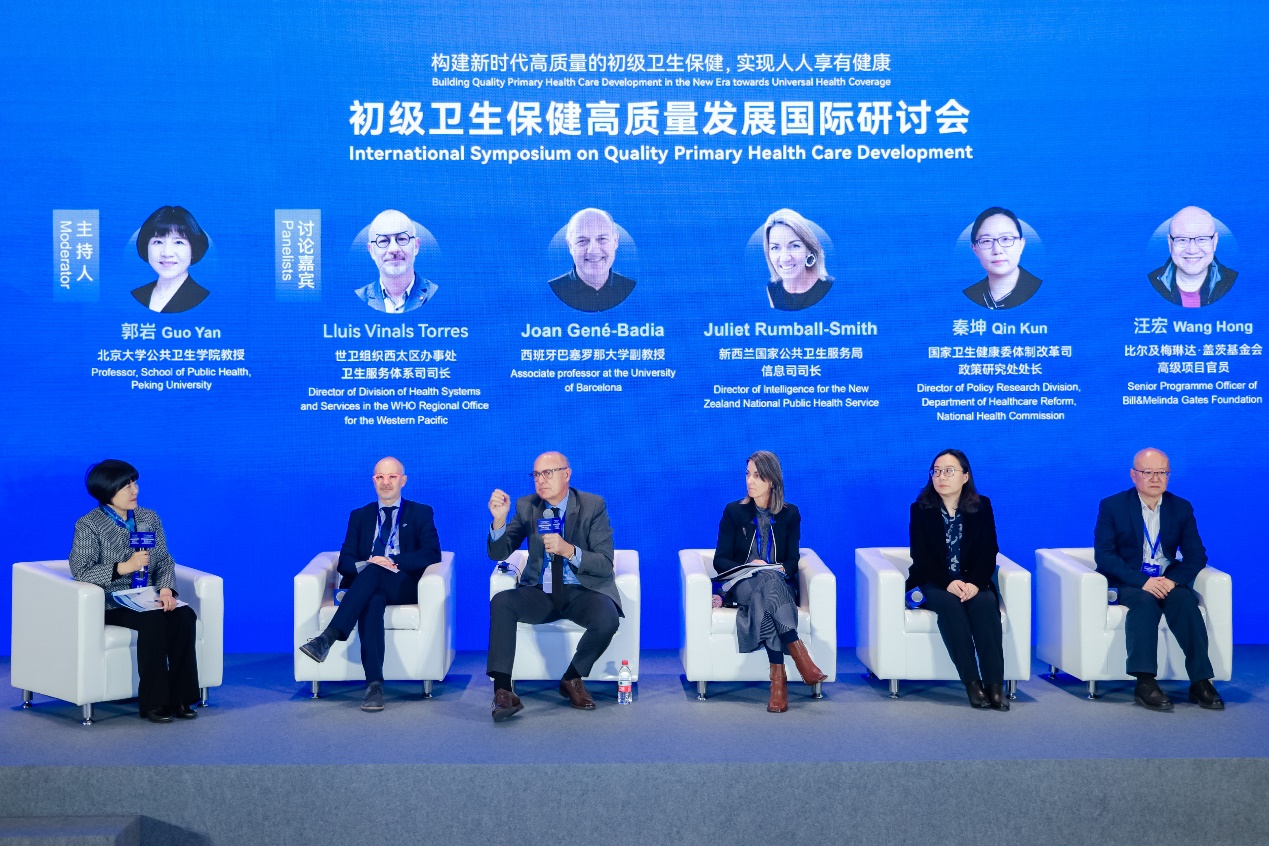
(專題一“推動服務體系轉型👨👨👦,構建以基層為基礎的整合型服務”圓桌討論)
第二個專題是“初級衛生保健與創新,包括技術和治理創新”,世界衛生組織總部衛生體系韌性和基本公共衛生組負責人索赫爾·賽卡特、香港大學護理意昂教授👨🏻🏭、校長辦公室高級顧問陳肇始🚙、上海市衛生健康委員會副主任付晨🙅🏼♀️、浙江省寧波市衛生健康委員會副主任史國建,進行觀點和經驗分享,聯合國兒童基金會駐華辦事處兒童健康與發展處處長石艾黎主持該專題報告。
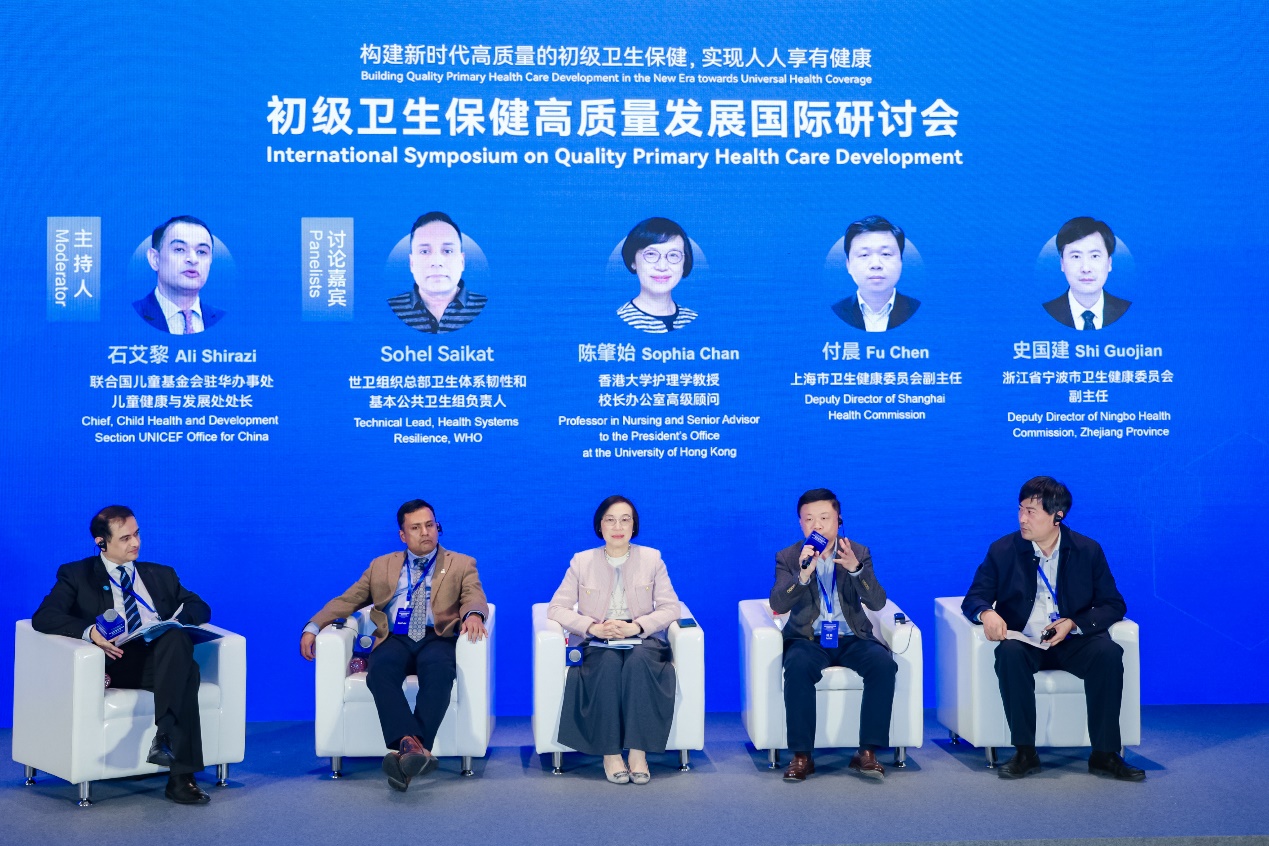
(專題二“初級衛生保健與創新,包括技術和治理創新”系列報告)
在圓桌討論環節🐦,國務院研究發展中心社會發展研究部一級巡視員葛延風𓀄、山東大學意昂体育官网原院長李士雪🧁、海南省衛生健康委員會副主任張毓輝、首都醫科大學全科醫學與繼續教育意昂院長吳浩、中國發展研究基金會副秘書長俞建拖、新西蘭國家公共衛生服務局主任朱麗葉·朗博爾-史密斯圍繞整合型醫療衛生服務提供體系的機製設計🫁✸、如何賦能基層醫療衛生機構🛫、信息技術和創新方案等展開討論🔎,昆山杜克大學全球健康項目聯合主任劉運國教授主持圓桌討論。

(專題二“初級衛生保健與創新,包括技術和治理創新”圓桌討論)
12月5日召開了第三個專題報告👳🏿,主題為“構建賦能初級衛生保健的支持體系”,世界家庭醫學組織前主席李國棟、國家衛生健康委員會財務司一級巡視員劉魁👕、首都醫科大學國家醫療保障研究院副院長應亞珍🙋♂️、首爾國立大學意昂体育官网教授權純晚、澳門特別行政區政府衛生局局長羅奕龍🤙🏼、甘肅省衛生健康委員會副主任白育萍分別圍繞初級衛生保健人力規劃、衛生投資🧕🏻、醫療保障製度等分享了經驗和作法,該專題報告由中國社區衛生協會會長陳博文主持🎉。
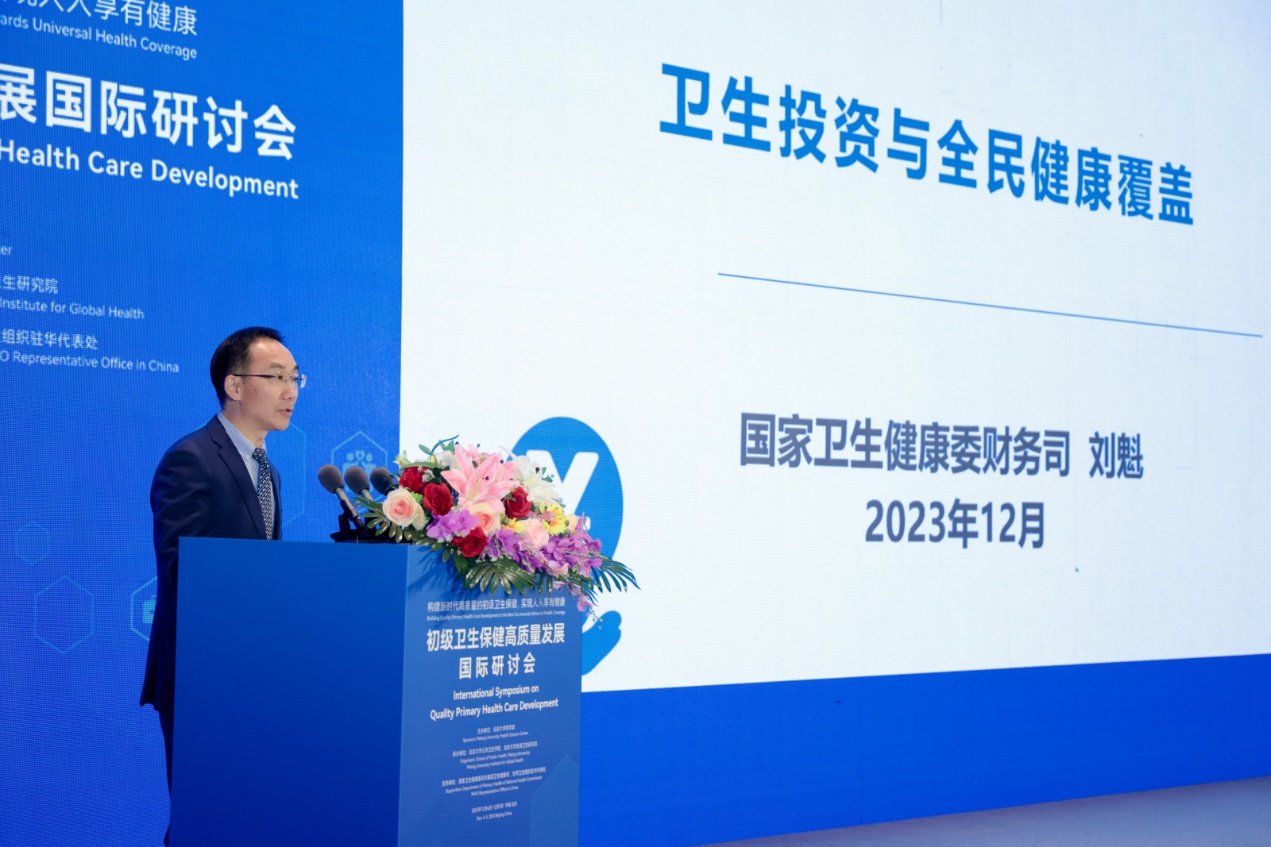
(國家衛生健康委員會財務司一級巡視員劉魁專題報告)
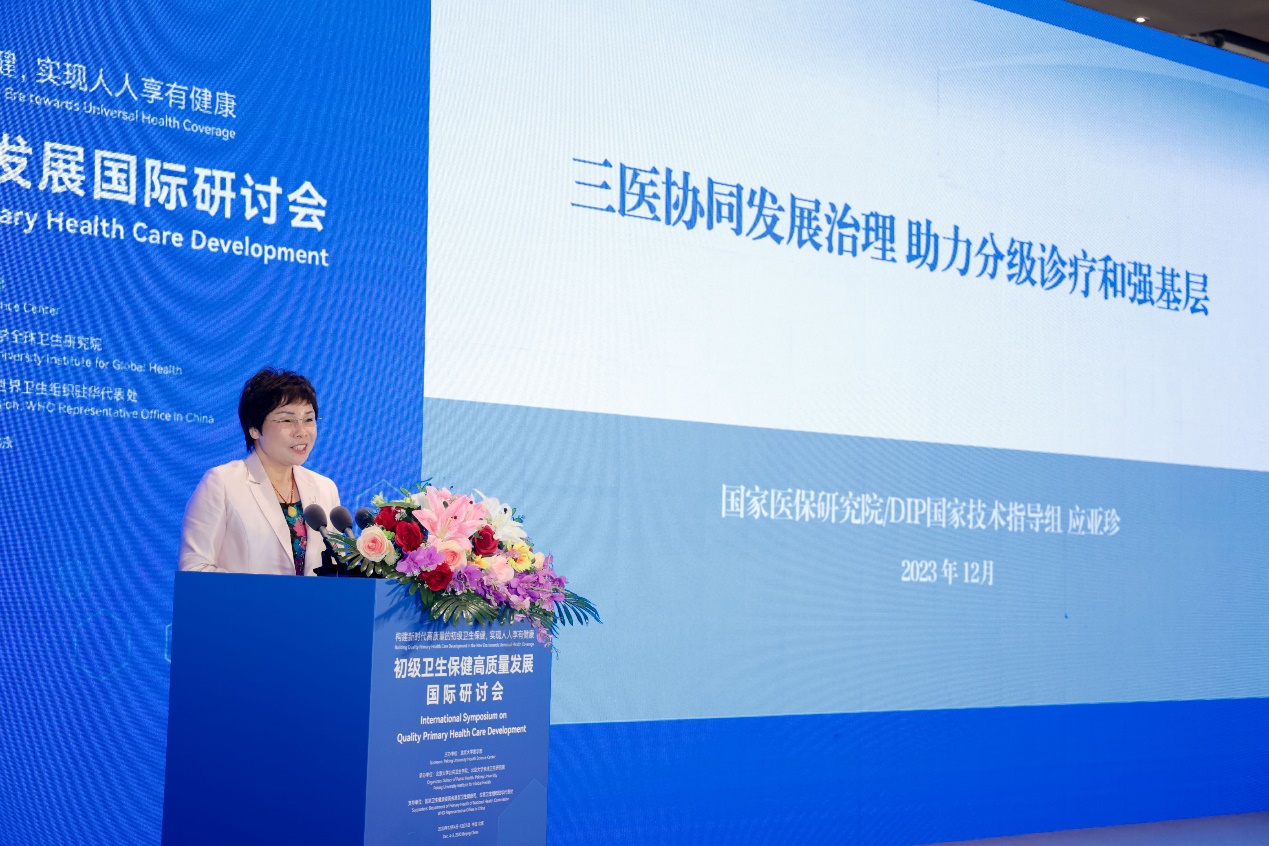
(首都醫科大學國家醫療保障研究院副院長應亞珍專題報告)
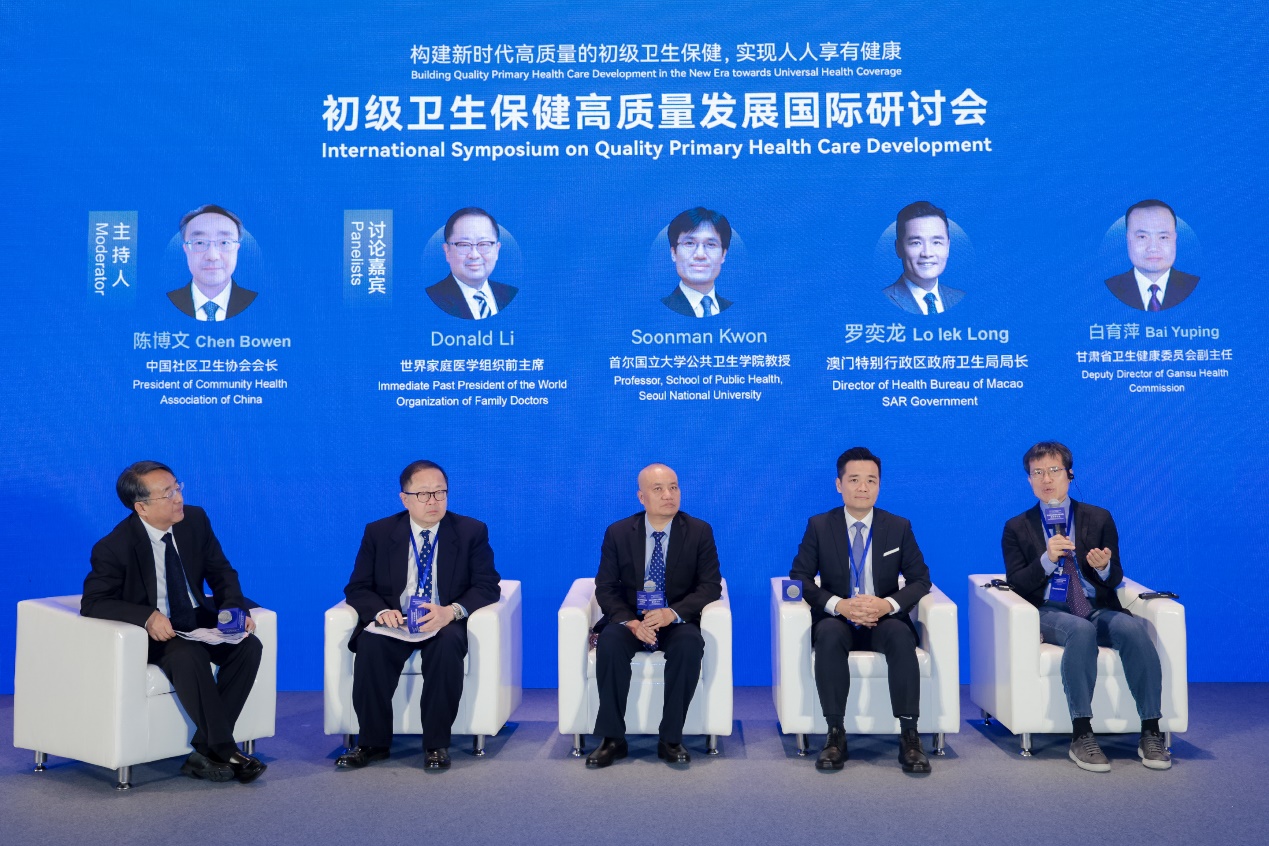
(專題三“構建賦能初級衛生保健的支持體系”系列報告)
最後的圓桌討論環節由華中科技大學同濟醫意昂醫藥衛生管理意昂院長姚嵐主持🦽,壽光市衛生健康局黨組書記、局長李群成、中國農村衛生協會會長張朝陽💆🏼、中國社會科意昂健康業發展研究中心副主任陳秋霖、國家衛生健康委員會衛生發展研究中心研究員秦江梅、意昂体育教授張拓紅👨🏼🍳👩🏿⚖️、蒙古衛生和社會保險總局政策規劃部綜合福利部主任巴亞博爾德·布德拉查就如何有效實現跨部門合作、發揮醫保戰略購買的作用、調動基層醫療衛生機構人員積極性等問題展開熱烈討論。
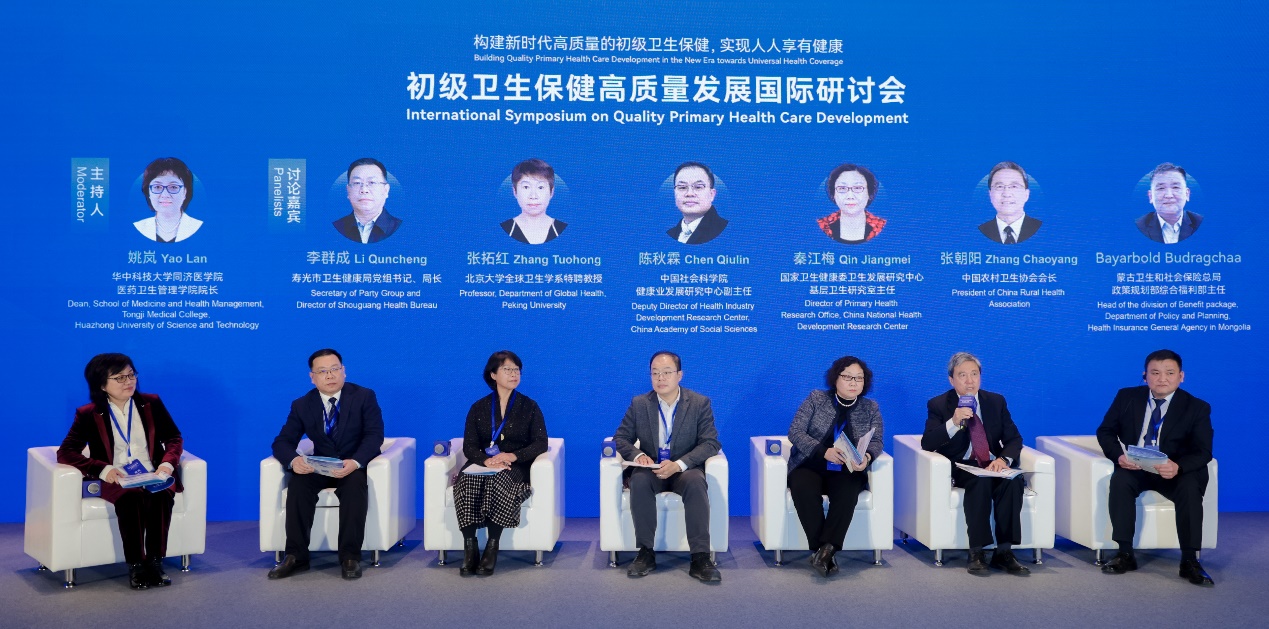
(專題三“構建賦能初級衛生保健的支持體系”圓桌討論)
本次論壇的宗旨是響應2023年9月聯合國大會召開的全民健康覆蓋高級別會議通過的政治宣言🎥,為加強基於初級衛生保健🦘⬆️、面向未來的衛生體系做出政治承諾🖐🏽,豐富初級衛生保健高質量發展的內涵🦸🏽,通過分享國內、國際相關實踐經驗🍈,推動理論創新,凝聚各方共識,提出新時代中國初級衛生保健高質量發展的政策和倡議🥎,為推動落實全球目標做出貢獻。
附件
初級衛生保健高質量發展北京倡議
Beijing Initiative on Quality Primary Health Care Development
我們,參加2023年12月4日至5日在中國北京舉行的初級衛生保健高質量發展國際研討會的全體人員👐🏼,一致同意堅持《阿拉木圖宣言》和《阿斯塔納宣言》的原則,即初級衛生保健是增強人們健康與福祉的最有效方法。聯合國可持續發展目標以及2023年聯合國大會全民健康覆蓋高級別會議的政治宣言重申了初級衛生保健的時代意義。我們再次強調,在不同的國家和地區💋,初級衛生保健的原則不僅有效👨🏿🔬,而且非常關鍵👦。
We, the participants of the International Symposium on Quality Primary Health Care Development, held on Dec 4-5, 2023 in Beijing, China, unanimously agree with insisting the principles of the Declaration of Alma-Ata and the Declaration of Astana that primary health care is the most effective way to improve people's health and well-being. The United Nations’ Sustainable Development Goals and the Political Declaration of the United Nations General Assembly’s 2023 high-level meeting on Universal Health Coverage have reaffirmed the importance of primary health care in our time. We reemphasize that in all countries and regions, the approach of primary health care is not only valid but critical.
初級衛生保健的重要性在人類面臨重大社會轉型和傳染性疾病大流行挑戰期間尤為顯著。在應對全球人口老齡化、氣候變化所引發的健康問題💔、普遍存在且日益增加的非傳染性疾病和精神衛生負擔🦧,以及解決醫藥產品可及的“最後一公裏”上,初級衛生保健有著獨特的優勢。
The importance of primary health care is particularly evident as human beings experience profound challenges, including social transitions and the pandemic caused by infectious diseases. Primary health care has its unique advantage in addressing challenges to global health posed by ageing and climate change, prevailing and constantly increasing burden of non-communicable diseases and mental health, and the "last-mile" of access to health care and medical products.
自《阿拉木圖宣言》以來,世界各國在實施初級衛生保健🧓🏻、改善國民健康方面,不同程度地積累了適合各自社會經濟環境的寶貴經驗。這些經驗是人類的共同財富,也是實現與健康相關的2030可持續發展目標的重要基礎。中國是世界上最早的開展基層為主導的初級衛生保健雛形的國家之一。中國的三級醫療預防保健網👋🏼、赤腳醫生、合作醫療和中西醫結合製度,被世界衛生組織和聯合國兒童基金會總結為適宜人力🧕🏻、適宜技術。中國通過實施《“健康中國2030”規劃綱要》和衛生體系改革,深入開展愛國衛生運動和健康中國行動等,不斷踐行初級衛生保健的理念和實踐,堅定地支持在所有社會經濟發展條件下推行初級衛生保健🧑🏿🦰。
Since the adoption of the Alma Ata Declaration, countries around the world have accumulated valuable experience in implementing primary health care and improving people’s health across diverse socioeconomic settings. Such experience constitutes a common treasure of human beings and an important foundation for achieving the health-related 2030 Sustainable Development Goals. China is one of the earliest countries in the world providing the model of community-led primary health care. China's three-level health service network, barefoot doctors, cooperative medical scheme, and integration of traditional Chinese and Western medicine was concluded by the World Health Organization and the United Nations Children's Fund as appropriate workforce and appropriate technology. With coordinated and continuous effort such as the patriotic health campaign, the implementation of health system reform and Healthy China 2030 strategy, China continues to adhere to the approach of primary health care in practice and firmly supports the promotion of primary health care at all stages of socioeconomic development.
我們認為💪🏻,初級衛生保健應該是高質量的🅰️。它體現為以人為本、整合的、全面的、連續的☝🏿👩🏼🦰、以社區為基礎的;是全民可及、可負擔🚁、可接受的;其服務應當主要由訓練有素、能力充分、有效激勵、高度負責的基層衛生機構人員提供;初級衛生保健應當成為衛生體系韌性和實現全民健康覆蓋的基石🤸🏼♂️,並隨著時代發展和科技進步,不斷賦予新的內涵。建成高質量初級衛生保健是各國政府所有部門、社會所有各方面力量的共同責任。
We believe that primary health care should be quality assured. By quality, we mean primary health care should be people-centered, integrated, comprehensive, continuous, and embedded in the community; it should be accessible, affordable, and acceptable to all people; primary care services should be provided by well-trained, competent, effectively motivated, and highly committed health personnel; primary care services should act as the cornerstone of a resilient health system and the foundation of universal health coverage. And more importantly, it should continue to adapt and develop, in particular taking advantage of technological advancement. Building quality primary health care is the shared responsibility of all government departments and all sectors of society.
我們倡議各國開展並加強如下行動,以推進初級衛生保健的高質量發展👩🏿🔧。
To promote high quality development of primary health care, we call on all countries to carry out and strengthen the following actions:
1. 落實政府承諾和責任
Fulfill political commitment and accountability
我們呼籲以促進個人和全民健康福祉為目標,落實政府領導、保障、管理和監督責任,統籌發展和改革創新,構建優質、高效🛻、系統、連續、整合型初級衛生保健體系,堅持預防為主、防治結合,促進所有人機會均等地享有可及🧑🏿🦲、可負擔的基本醫療衛生服務🌧,推動初級衛生保健高質量發展🥏。
We call on all political leaders and governments to uphold the goal of improving the health and well-being of individuals and populations, fulfill their responsibilities in leadership, safeguarding and supervision, and steward health development and reform, to build a strong and high-quality primary health care system as part of integrated people-centered health services. All political leaders and governments should put prevention first and integrate prevention and treatment, promote equal opportunities for all people to enjoy accessible and affordable essential health services, and promote high quality development of primary health care.
2. 通過多部門協同將健康融入所有政策
Achieve “health in all policies (HiAP)” through multisectoral coordination
我們倡導“將健康融入所有政策”,強調公共政策對公眾健康的重要作用💖。各部門各行業應加強溝通協作,將健康理念融入各項政策及其製定過程💛,形成促進健康的合力。應該建立健康影響評估評價製度,完善監管機製和問責機製👷🏻♀️,保障將“健康融入所有政策”落地見效🧛🏻♂️。
We advocate the approach of "health in all policies (HiAP)" and emphasize the important role of public policies for public health. All sectors and industries should strengthen communication and collaboration, integrate health into various policies and their formulation processes, and form synergy to promote health. We support the establishment of a system of health impact assessment and evaluation, improve the mechanism of supervision and accountability, and ensure that HiAP is implemented and enforced.
3. 建立可持續的籌資
Establish sustainable financing
我們倡導建立可持續的初級衛生保健籌資策略,加大和保障衛生事業的公共經費投入🫲🏻👼🏼。應該建立公平為導向的籌資機製🔢,明確公共財政覆蓋的基本衛生服務包🎖,統籌多渠道的疾病預防和治療等衛生經費,確保基層衛生機構和一線服務提供者的經費充足🖐🏿。逐漸轉向戰略性購買以及按人頭付費為核心的、價值為導向的復合型支付方式。應用健康保險基金為預防服務供資👩👦。我們呼籲應該為低收入國家初級衛生發展提供可持續的資金支持👉🏼。
We advocate the establishment of a sustainable financing strategy for primary health care and increasing and ensuring adequate public funding. We advocate the establishment of an equity-oriented financing mechanism, specification of a primary health service package that can be expanded over time and adapted to national and local context, coordination of multi-channel health funding for disease prevention and treatment and ensuring that funding for primary care facilities and front-line service providers are fully paid in their budgets. We call for strategic purchasing and step-wise shift towards a value-oriented blended payment method with capitation as the base. We call for using health insurance funds to purchase preventive services. We call for provision of sustainable financing support to low-income countries for development in primary health care.
4. 賦能社區和個人
Empower communities and individuals
我們呼籲人們提升健康意識🧩,人人參與👩🏿🍼🔱、人人盡力⚄🦹♂️、人人享有。應該把社區打造為健康的生態和生活環境🐂,橫向惠及全人群🌷,縱向覆蓋全生命周期♎️,以預防為主,減少疾病發生;通過社區便捷的醫療衛生服務,使得疾病早診斷🤦🏽、早治療、早康復。
We call on raising health awareness to ensure that everyone participates in, makes their best contribution to, and enjoys health improvement. We advocate communities to create a healthy ecosystem and living environment that benefits the entire population horizontally and covers the entire life cycle vertically. We call for a focus on prevention to reduce the occurrence of diseases. We advocate provision of accessible health services in the community, to achieve early diagnosis, early treatment, and early rehabilitation of diseases and health conditions.
5. 提供以社區為基礎的整合型服務
Provide community-based integrated care
我們提倡建立覆蓋全民的、基於社區的整合型初級衛生保健服務,以滿足各年齡段、各類人群的日常衛生健康需要;以初級衛生保健服務為核心,協調患者和社區居民全方位的衛生健康服務,實現跨所有場所(包括家庭🚏、生活社區、醫療衛生機構、長期照護機構等)的預防🛀🏼、治療、康復、護理和安寧療護的連續和整合,探索醫防融合的衛生服務模式創新;我們呼籲將初級衛生保健納入疫病大流行等突發公共衛生應急準備◼️、防範和響應的核心服務內容。
We advocate the establishment of community-based integrated primary health services that cover the entire population and meet the daily health needs of people of all ages and from all population groups. We advocate the establishment of primary care services as the core, to coordinate all-round health services for patients and community residents and achieve the continuity and integration of prevention, treatment, nursing, rehabilitation and palliative care across all settings (including families, living communities, health care institutions, and long-term care institutions), exploration of innovative health service models to integrate medical treatment and prevention. We call upon integration of primary health care into the core components in preparedness, prevention and response to pandemic and other public health emergencies.
6. 以良好的治理促進健康服務和社會服務銜接融合
Promote the connection and integration of health services and social services through good governance
我們呼籲做實基層治理網絡、提升治理效能🔖,增進初級衛生保健與公共服務銜接🫵🏻,促進人群健康目標改進1️⃣。在社區屬地範圍內,發揮政府🙅🏻♀️、自治組織等資源調配作用👩🦳,調動社會組織👁、誌願者、經濟組織等參與積極性,增進健康協調人👎🏿、家庭醫生團隊等樞紐功能🎂,提高健康素養,加強自我健康管理小組建設🫢,將養老、助殘、兒童😭、婦幼、心理健康等公共服務深度融入初級衛生保健服務。
We call for good health governance functions and better alignment between implementation and policies, to empower and promote community engagement and participation. We call for strengthening community-level governance, enhancing the connection between primary health care services and social services, and promoting the improvement of population health. Within the community catchment, governments, autonomous organizations and others should play fully the role of resource allocation, enhance hub function of primary care providers such as health coordinators and family doctor teams, improve health literacy, strengthen the construction of self-management groups, and cooperate with civil societies, volunteers, and economic organizations, to deeply integrate public services such as elderly care, disability assistance, and mental health, psychological counseling into primary care services.
7. 加強人力資源的培訓𓀝、配置和激勵及醫學教育
Enhance training, allocation and motivation of health workforce, and medical education
我們支持增加農村🏮、偏遠和欠發達地區人員配置🧑🏿🚀,促進人力資源配置的公平性,加強初級衛生保健服務配置適宜的人力資源🦥。應加大全科醫生/家庭醫生培養和培訓力度,建立全科醫生/家庭醫生培養和使用激勵機製。應該為在基層衛生機構工作的衛生人員創造良好的工作環境,提供合理的報酬,調動其積極性以便有效滿足居民的基本醫療衛生服務需求。
We support increasing allocation of health workforce in rural, remote and underdeveloped areas, promoting equity in human resource allocation, and strengthening primary health care services with appropriate human resources allocation. The training of general practitioners/family doctors should be strengthened, and an incentive mechanism for the training and employment of general practitioners/family doctors should be established. We call for creating a good working environment for health personnel working in primary health care settings, providing reasonable remuneration, to motivate providers to effectively meet the basic health service needs of people.
8. 推廣傳統醫學和替代醫學在疾病預防和疾患療愈中的應用
Expand application of traditional and alternative medicine for disease prevention and illness healing
我們贊同傳統醫學是初級衛生保健的組成部分,把傳統醫學和替代醫學的適宜技術應用於社區🔄,基層醫療衛生機構提供從預防🍁𓀊、保健到治療、康復的有效醫學服務;在基層衛生服務專業人員的指導下👴🏻,人們可以主動使用傳統和替代醫學預防、治療疾病。
We recognize traditional medicine as an integral part of primary health care, and support the application of appropriate technologies of traditional medicine and alternative medicine to the community. We support that primary care institutions should provide effective alternative medicine services from prevention and health care to treatment and rehabilitation. We support that people voluntarily use traditional and alternative medicine to prevent and treat diseases, under the guidance of community health services professionals.
9. 數字賦能初級衛生保健
Empower primary health care with digital technology
我們倡議進一步加強數字技術在初級衛生保健中的應用,增進初級衛生保健服務的優質化🥕、個性化、精準化和便捷性。推進以居民電子健康檔案為核心的健康信息互通共享。發展人工智能輔助診斷🩲、遠程醫療等手段,助力衛生可及性和診療質量提升。發展線上預約、雲端問診、電子處方流轉、智能藥房💩、線上支付、遠程健康教育等應用和可穿戴健康設備,助力健康全程管理和自我健康管理。在釋放數字技術紅利過程中持續強化監管,規避潛在風險💁🏼♀️🚣🏽♂️。
We advocate strengthened application of digital technology in primary health care, to improve the quality, individualization, precision and convenience of primary health care services. We advocate promotion of the exchange and sharing of health information with residents’ electronic health records as the core. We advocate development of artificial intelligence-assisted diagnosis, telemedicine and other means to help improve the quality of diagnosis and treatment. We call for further development of online appointment booking, cloud-based consultation, electronic prescription, smart pharmacy, online payment, remote health education and other applications and wearable health devices to facilitate comprehensive health management and self-management of health. With rapid scale up, we call for effective governance and regulation to harness digital innovation to minimize risks while maximizing benefits.
10. 確保醫藥產品和適宜技術的可及
Ensure access to medicinal products and appropriate technologies
我們強調初級衛生保健在保障以基本藥物為重點的藥品👩🚀、疫苗、適宜技術等在全人群,特別是弱勢群體可及中的關鍵作用🥥。醫藥產品供給體系應該與初級衛生保健製度深度融合,助力基層衛生服務提供者更好地服務於全生命周期醫藥產品公平可及和適宜技術應用,推廣產檢包、營養包等整合型初級衛生保健服務產品的創新👩🦽➡️。
We emphasize the key role of primary health care in ensuring that medicines, vaccines, appropriate technologies, are accessible to the entire population, especially the vulnerable groups. We call for further integration of the pharmaceutical product supply system and the primary health care system; we support primary health service providers to better serve the equitable accessibility of pharmaceutical products throughout the life cycle and appropriate technology applications, and exploration of the innovation and promotion of integrated primary health care, such as prenatal care packages and nutrition packages.
11. 增進全球夥伴關系與國際衛生合作
Strengthen global partnership and international health cooperation
我們呼籲建立多層次👗、多形式的國際合作交流渠道👨🦯,加強全球初級衛生保健夥伴關系,開展經驗交流、技術推廣、人才培養、衛生援助🔣、資源開發等方面務實合作,維護🧻😨、改善、促進所有人群尤其是兒童👩🏻✈️、青少年、孕產婦👡、老年人🧔🏻、殘疾人和貧困脆弱等人群的健康,有效預防、管理、控製傳染性疾病、慢性非傳染性疾病以及其他主要健康問題🥲,不讓一個人掉隊🐔,促進實現全民健康覆蓋。
We call for the establishment of multi-level and multi-form international cooperation and exchange channels, strengthening of global partnerships on primary health care, and pragmatic cooperation in experience exchange, technology promotion, personnel training, health assistance, resource mobilization; maintaining, improving, and promoting the health of all population groups, in particular children, adolescents, pregnant women, the elderly, disabled people, the poor and other vulnerable groups, effectively prevent, manage, and control communicable diseases, non-communicable diseases, and other major health challenges, leaving no one behind and promoting universal health coverage.